
EUROPEAN PHYSICAL JOURNAL D
Scope & Guideline
Navigating the Evolving Landscape of Atomic and Molecular Research
Introduction
Aims and Scopes
- Atomic and Molecular Physics:
Research focusing on the structure, dynamics, and interactions of atoms and molecules, including studies on ionization, scattering processes, and electronic transitions. - Quantum Optics and Information:
Exploration of quantum phenomena, including entanglement, quantum states manipulation, and applications in quantum information science. - Plasma Physics:
Investigations into the behavior of plasmas, including non-thermal plasmas, their interactions with electromagnetic fields, and applications in energy and materials science. - Spectroscopy and Photonics:
Studies utilizing various spectroscopic techniques to analyze atomic and molecular systems, as well as developments in photonic devices and applications. - Computational Methods and Theoretical Physics:
Application of computational techniques and theoretical frameworks to model and predict behaviors in quantum systems, including simulations of atomic and molecular interactions.
Trending and Emerging
- Quantum Technologies:
There is a marked increase in research on quantum technologies, including quantum computing, quantum cryptography, and the manipulation of quantum states, indicating a significant shift towards practical applications of quantum mechanics. - Machine Learning in Physics:
The integration of machine learning techniques in data analysis and modeling within atomic and molecular physics is gaining traction, highlighting a trend towards computationally intensive methodologies. - Advanced Spectroscopic Techniques:
Emerging interest in sophisticated spectroscopic methods, such as attosecond spectroscopy and ultrafast laser techniques, is evident, reflecting a desire to probe ultrafast processes at the quantum level. - Plasma Applications in Medicine and Environment:
Research focusing on the applications of non-thermal plasmas in biomedical fields and environmental remediation is on the rise, showcasing the interdisciplinary nature of contemporary plasma research. - Hybrid Quantum Systems:
The study of hybrid systems that combine different physical phenomena, such as optomechanics or plasmonic interactions, is trending, indicating a move towards complex systems that can exhibit novel properties.
Declining or Waning
- Classical Physics Approaches:
Research employing classical mechanics to address atomic and molecular phenomena has decreased, as the field increasingly favors quantum mechanical frameworks. - Static Models in Atomic Theory:
Interest in static models for understanding atomic structures and interactions has diminished in favor of more dynamic and time-dependent approaches. - Traditional Plasma Diagnostics:
The focus on conventional plasma diagnostic techniques has waned, with a shift towards more innovative and sophisticated methods that leverage advancements in technology.
Similar Journals

JOURNAL OF RUSSIAN LASER RESEARCH
Exploring Innovations in Laser TechnologiesThe Journal of Russian Laser Research, published by Springer, stands as a vital resource for researchers and professionals in the fields of atomic and molecular physics, as well as optics and engineering. With its ISSN 1071-2836 and E-ISSN 1573-8760, this journal has been disseminating groundbreaking research since its inception in 1994, with a dedicated focus on the advancement of laser technologies and their applications. While it currently holds a Q4 classification in both Atomic and Molecular Physics and Engineering categories, its commitment to fostering novel insights and innovative methodologies positions it as a promising platform for emerging studies within these disciplines. Although the journal does not offer open access options, it continues to draw attention with a growing citation index. By publishing diverse research articles, reviews, and critical discussions, the Journal of Russian Laser Research not only enriches academic literature but also serves as a stepping stone for students and professionals seeking to deepen their understanding of laser science and its myriad applications.
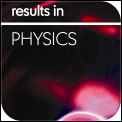
Results in Physics
Where Physics Meets Open Access ExcellenceResults in Physics, an esteemed open-access journal published by ELSEVIER, has been a prominent platform for disseminating cutting-edge research in the field of physics since its establishment in 2011. With its ISSN 2211-3797 and E-ISSN 2211-3797, this journal proudly holds a Q2 ranking in the Physics and Astronomy category for 2023, showcasing its significance and quality within the scientific community. With a remarkable Scopus rank of #28 out of 243 in the general physics and astronomy domain, placing it within the 88th percentile, Results in Physics serves as a vital resource for researchers, professionals, and students alike, fostering a collaborative environment for the advancement of knowledge across various subfields. The journal aims to provide a rapid and unrestricted access to innovative findings, encouraging open scientific dialogue and enhancing the visibility of breakthrough research. Located in the Netherlands at RADARWEG 29, 1043 NX AMSTERDAM, Results in Physics continues to uphold its commitment to excellence and accessibility in the ever-evolving landscape of physics research.

Optics Continuum
Exploring the Boundaries of Optical EngineeringOptics Continuum, published by Optica Publishing Group, is a pioneering open access journal dedicated to advancing the field of optics and photonics. Since its inception in 2022, this journal seeks to provide a vital platform for the dissemination of groundbreaking research and innovative developments across several interconnected domains, including electrical and electronic engineering, atomic and molecular physics, and material sciences focused on electronic, optical, and magnetic materials. With impressive rankings in Scopus—placed #384 in Electrical and Electronic Engineering and #109 in Atomic and Molecular Physics—the journal aims to engage a diverse readership comprised of researchers, professionals, and students, promoting collaboration and knowledge exchange. The journal's open access model ensures that cutting-edge research is readily available to all, nurturing an inclusive academic environment. For those interested in staying at the forefront of optics research, Optics Continuum is an essential resource that continuously enriches the global scientific community.
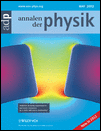
ANNALEN DER PHYSIK
Charting New Territories in Physics and AstronomyANNALEN DER PHYSIK, a prestigious journal published by WILEY-V C H VERLAG GMBH, stands as a cornerstone of the field of physics and astronomy since its inception in 1799. With an ISSN of 0003-3804 and an E-ISSN of 1521-3889, this journal provides a platform for innovative research and critical discourse across various domains of physics. Annalen der Physik is currently ranked in the Q2 category for general physics and astronomy, occupying rank #76 out of 243 in Scopus, placing it within the 68th percentile. This indicates its significant impact and the quality of research it publishes. Although the journal does not offer Open Access options, its robust historical lineage and ongoing contributions ensure that it continues to be an essential resource for researchers, professionals, and students alike. For those seeking to stay at the forefront of contemporary physics research, ANNALEN DER PHYSIK represents a vital source of knowledge, innovation, and scholarly communication.

Physical Review Research
Unlocking the universe through open access research.Physical Review Research, published by the American Physical Society, is a premier open access journal dedicated to the dissemination of high-quality research across all areas of physics and astronomy. Since its inception in 2019, this journal has quickly established itself as a vital platform for researchers, achieving a prestigious Q1 ranking in the dynamics of Physics and Astronomy (miscellaneous) and holding a commendable position in the Scopus Rankings with a rank of #29 out of 243, placing it in the 88th percentile. With the commitment to fostering scientific collaboration and transparency, Physical Review Research offers unrestricted access to valuable findings, enabling researchers, professionals, and students alike to engage with cutting-edge contributions in general physics and astronomy. As it converges into its forthcoming years of publication, the journal remains dedicated to showcasing rigorous research and innovative ideas that drive the field forward.
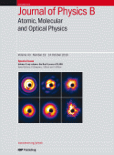
JOURNAL OF PHYSICS B-ATOMIC MOLECULAR AND OPTICAL PHYSICS
Connecting Theoretical Foundations with Experimental InnovationsJOURNAL OF PHYSICS B-ATOMIC MOLECULAR AND OPTICAL PHYSICS, published by IOP Publishing Ltd, stands as a key platform within the fields of atomic, molecular, and optical physics. With an impressive history spanning from 1988 to 2024, this journal is recognized for its high-quality research contributions, holding a Q2 ranking in both Atomic and Molecular Physics and Optics, and Condensed Matter Physics, as of 2023. While not an open-access journal, it continues to attract a broad readership and submissions due to its commitment to disseminating knowledge that is at the forefront of contemporary physics research. The journal's ISSN 0953-4075 and E-ISSN 1361-6455 signal its accessibility and relevance in academic discourse. As researchers, professionals, and students delve into the intricate phenomena of quantum mechanics and photonics, they will find pivotal studies and insights within these pages, reinforcing JOURNAL OF PHYSICS B's stature as an esteemed resource in the ever-evolving landscape of physics.

LASER PHYSICS
Shaping Tomorrow’s Laser Applications TodayLASER PHYSICS is a premier academic journal published by IOP Publishing Ltd, dedicated to the exploration and advancement of fundamental and applied research in the fields of Atomic and Molecular Physics, Optics, Condensed Matter Physics, Industrial and Manufacturing Engineering, and Instrumentation. Since its inception in 1996, the journal has been a vital resource for researchers and professionals, contributing significantly to the collective understanding of laser technology and its applications. With a consistent Q3 ranking across several sub-disciplines in the 2023 categories, LASER PHYSICS is recognized for its rigorous peer-reviewed articles that push the boundaries of current knowledge. Although primarily subscription-based, the journal aims to disseminate high-quality research to enhance the scientific community's collaboration. As the journal continues to shape the future of laser science until 2024 and beyond, it stands as an essential platform for both emerging and established scholars seeking to publish innovative findings in this dynamic field.
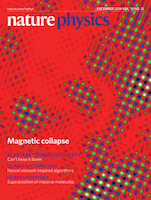
Nature Physics
Discovering the Dynamics of Nature Through PhysicsNature Physics is a premier journal dedicated to publishing high-impact research in the realm of physics, brought to you by the esteemed NATURE PORTFOLIO. With its ISSN 1745-2473 and E-ISSN 1745-2481, this journal has established itself as a vital resource for the physics community, enjoying a remarkable Q1 quartile ranking in the Physics and Astronomy category for 2023 and securing an impressive Rank #5/243 and a 98th percentile ranking in Scopus. Since its inception in 2005, Nature Physics has become a catalyst for innovation, featuring cutting-edge research that encompasses a broad spectrum of physics disciplines. Although it operates under traditional subscription models, it maintains a commitment to accessibility through selective publications and editorial excellence. Positioned in Berlin, Germany, this journal is a must-read for researchers, professionals, and students who seek to stay at the forefront of advancements in physics.
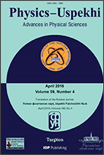
PHYSICS-USPEKHI
Connecting Researchers Through High-Impact SciencePHYSICS-USPEKHI, published by Uspekhi Fizicheskikh Nauk, is a prominent peer-reviewed journal in the field of physics and astronomy, reaching researchers and professionals since its inception in 1993. With an ISSN of 1063-7869 and an E-ISSN of 1468-4780, this esteemed journal has been classified as Q2 in the Physics and Astronomy category based on the 2023 quartiles, ranking 74 out of 243 journals in its Scopus classification, placing it in the 69th percentile. Although currently not an open access journal, it provides invaluable insights and advancements in the field, fostering an environment for scholarly exchange and collaborative research. Based in Moscow, Russia, PHYSICS-USPEKHI continues to shape the landscape of theoretical and experimental physics, inviting submissions that contribute to its rich legacy of high-impact scientific discourse.

FEW-BODY SYSTEMS
Championing High-Quality Research in Quantum SystemsFEW-BODY SYSTEMS is a distinguished journal published by Springer Wien, dedicated to advancing the field of Atomic and Molecular Physics and Optics. With an ISSN of 0177-7963 and an E-ISSN of 1432-5411, this scholarly periodical has been a vital resource since its inception in 1986, with a continued commitment to disseminating high-quality research up to 2024. Recognized in the Q2 quartile in its category and ranked 132 out of 224 in Scopus within the relevant fields, FEW-BODY SYSTEMS provides a platform for innovative studies that explore the complexities of few-body quantum systems, fostering discussions that enhance scientific understanding and technological advancement. Based in Vienna, Austria, this journal reflects a global scholarly community's engagement with pressing theoretical and experimental topics, contributing significantly to the ongoing discourse in physics and optics. Although it does not currently offer open access options, it remains a reputable choice for researchers, professionals, and students eager to delve into the intricate dynamics of few-body interactions.